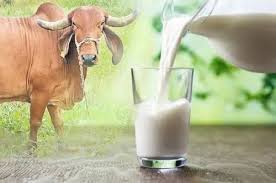Cow Milk Benefits: A Nutritional Powerhouse
Milk is a staple in many diets around the world, providing essential nutrients and serving as a versatile ingredient in countless recipes. While there are numerous milk alternatives available today, cow milk remains a popular choice due to its rich nutritional profile. This article explores why cow milk is considered healthier compared to other milk alternatives by comparing their nutritional content and health benefits.
Nutritional Profile of Cow Milk
Cow milk is renowned for its comprehensive nutritional benefits, making it a dietary cornerstone for many. Here are some key nutrients found in cow milk:
- Protein: Cow milk is an excellent source of high-quality protein, containing all nine essential amino acids necessary for the body’s growth, repair, and maintenance.
- Calcium: Essential for strong bones and teeth, cow milk is one of the richest dietary sources of calcium.
- Vitamins: Cow milk is packed with vitamins, including Vitamin D (fortified), which aids calcium absorption, Vitamin B12, essential for red blood cell production, and Vitamin A, crucial for vision and immune function.
- Minerals: Besides calcium, cow milk provides other vital minerals such as phosphorus, potassium, and magnesium, which support various bodily functions.
- Healthy Fats: Whole cow milk contains healthy fats that are important for brain development and energy.
Comparing Cow Milk to Other Milk Alternatives
Let’s compare cow milk with several popular milk alternatives, focusing on their nutritional content and health benefits.
Almond Milk
Nutritional Profile:
- Calories: Lower in calories compared to cow milk, making it a popular choice for weight management.
- Protein: Significantly lower in protein.
- Calcium: Often fortified to match cow milk’s calcium content.
- Vitamins and Minerals: Fortified with Vitamin D and Vitamin E, but naturally lacks the comprehensive vitamin profile of cow milk.
Health Benefits:
- Suitable for those with lactose intolerance or dairy allergies.
- Low in saturated fat and calories.
Drawbacks:
- Inadequate protein for muscle repair and growth.
- Often contains added sugars and additives.
Soy Milk
Nutritional Profile:
- Calories: Comparable to cow milk.
- Protein: Similar protein content, with all essential amino acids.
- Calcium: Fortified to match cow milk.
- Vitamins and Minerals: Fortified with B vitamins and Vitamin D.
Health Benefits:
- Suitable for lactose-intolerant individuals.
- Contains isoflavones, which have potential health benefits such as reducing cholesterol levels.
Drawbacks:
- Some individuals may have soy allergies.
- Contains phytoestrogens, which can interfere with hormone levels in large quantities.
Oat Milk
Nutritional Profile:
- Calories: Higher in calories compared to other milk alternatives.
- Protein: Lower protein content.
- Calcium: Fortified to match cow milk.
- Vitamins and Minerals: Often fortified with Vitamins D and B12.
Health Benefits:
- High in fiber, which aids in digestion and heart health.
- Suitable for those with nut or soy allergies.
Drawbacks:
- High in carbohydrates and calories.
- Lower protein content, requiring supplementation from other sources.
Coconut Milk
Nutritional Profile:
- Calories: Lower in calories compared to cow milk.
- Protein: Very low protein content.
- Calcium: Often fortified.
- Vitamins and Minerals: Contains medium-chain triglycerides (MCTs), but lacks other essential nutrients found in cow milk.
Health Benefits:
- Contains MCTs that are quickly used for energy.
- Suitable for those with lactose intolerance or nut allergies.
Drawbacks:
- Very low in protein, not suitable as a primary protein source.
- High in saturated fat.
Health Benefits of Cow Milk
Given its rich nutritional profile, cow milk offers several health benefits:
- Bone Health: The high calcium and Vitamin D content support strong bones and teeth, reducing the risk of osteoporosis.
- Muscle Growth and Repair: High-quality protein aids in muscle development and repair, making it ideal for athletes and active individuals.
- Weight Management: Studies suggest that the protein and fat content in cow milk can help with satiety, potentially aiding in weight management.
- Heart Health: Potassium in cow milk helps regulate blood pressure, contributing to heart health.
- Hydration: Cow milk is approximately 87% water, making it an effective hydrator, especially for children.
Choosing the Right Milk for You
While cow milk is highly nutritious, individual dietary needs and preferences vary. Here are some factors to consider when choosing the right milk:
- Lactose Intolerance: For those who are lactose intolerant, lactose-free cow milk or milk alternatives like almond, soy, or oat milk are suitable options.
- Allergies: Individuals with dairy allergies should opt for non-dairy alternatives like almond, soy, or coconut milk.
- Dietary Preferences: Vegans and those following a plant-based diet should choose fortified plant-based milk alternatives to ensure they receive essential nutrients.
- Nutritional Needs: Athletes or individuals needing higher protein intake may benefit from cow milk or protein-fortified plant-based milk.
Conclusion
Cow milk stands out as a nutritional powerhouse, providing a rich array of essential nutrients that support overall health. While milk alternatives offer benefits for those with specific dietary needs or preferences, they often lack the comprehensive nutritional profile found in cow milk. Understanding the nutritional content and health benefits of each type of milk can help individuals make informed choices that align with their health goals and dietary requirements.
By incorporating cow milk into a balanced diet, individuals can enjoy its numerous health benefits, from strong bones and muscles to improved heart health. As always, it is important to consider personal dietary needs and consult with healthcare professionals when making significant changes to one’s diet.
Thanks for visiting Gymbag4u.com
You may also love reading our following articles. https://gymbag4u.com/unraveling-the-truth-is-soy-milk-bad-for-men-s-health/ and https://gymbag4u.com/coconut-milk-uses-and-benefits/ and https://gymbag4u.com/milk-a-complete-food/ and https://gymbag4u.com/butter-milk-health-benefits-and-recipe-homemade-buttermilk/
